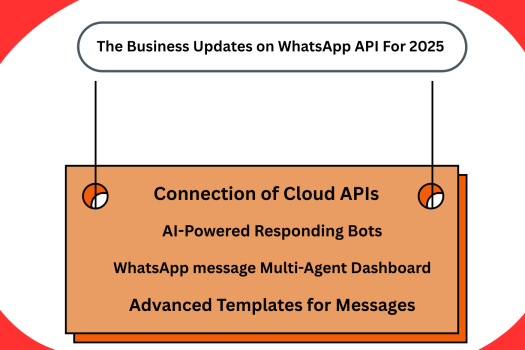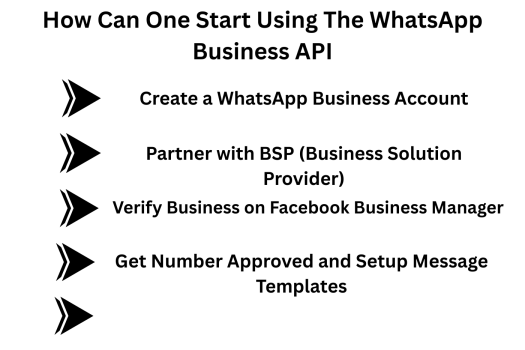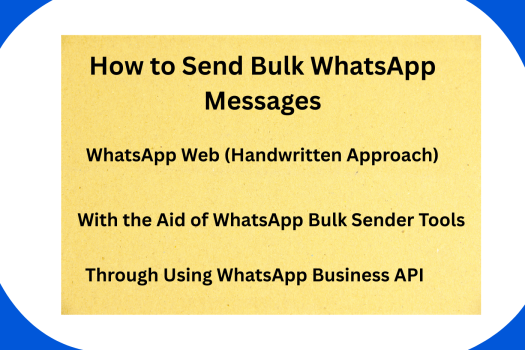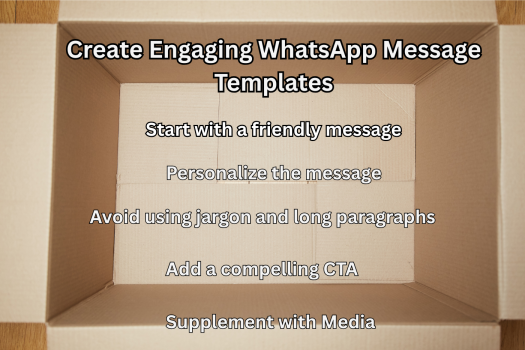BLOG'S
Table of Contents
Published on: May 26, 2025 05:20 PM
Send Bulk Broadcast WhatsApp Messages in 2025
By 2025, WhatsApp is still
reigning supreme in the field of instant messaging with over 2 billion users
worldwide. It is more than just a communication tool for companies; it serves
as a marketing power house. For brands
that seek to engage customers in a more personal way, Sending Bulk Broadcast WhatsApp Messages has evolved into the
marketing tool of absolute necessity. This tutorial explains everything from
what Bulk WhatsApp Messages are and
how to send them using the WhatsApp
Business API spotlighting the important features.
What are Bulk Broadcast WhatsApp Messages?
Bulk Broadcast WhatsApp Messages is the action of sending a single
message to multiple recipients without forming any groups. Businesses use it to
communicate with a wide audience through targeted messages such as
advertisement messages, reminders, updates or alerts.
While personal chat differs from
business communication, with the aid of a Bulk
WhatsApp sender tool, or through integration with the WhatsApp Business API, businesses message on a large scale. For
marketing teams on a mission to improve and strengthen the client-to-business
relationship, this type of bulk
messaging is efficient and invaluable.
The Relevance of WhatsApp for Business in 2025
In 2025, WhatsApp for Business has become increasingly important. With a
need for instant customer care and engaging brand interaction, companies are
utilizing WhatsApp to:
·
Social listening and competitive analysis.
·
Customer Support with automated replies.
·
Payment alerts/aside updates on delivery channel
confirmations.
Send and receive updates concerning WhatsApp (ads like broadcasts)
With a rise in demand for a WhatsApp business account, businesses
are claiming that the platform is reliable with secured communication and
distance. This reduces the gap of conversation between consumers and corporates
thus making WhatsApp business an
essential component in omnichannel marketing frameworks.
The Business Updates on WhatsApp API For 2025

In 2025, there’s a major
development in WhatsApp Business API,
expanding it is automation analytics and compliance capabilities. Some of the
updates include:
1. Connection of Cloud APIs
The Cloud API of Meta now makes it easier and quicker to connect with Business WhatsApp Accounts together
with cloud applications without taking over server burdens.
2. AI-Powered Responding Bots
Empowered AI allows smart
integrated chatbots to deal with matters such as FAQs, lead qualifications and
feedback within WhatsApp.
3. WhatsApp message Multi-Agent Dashboard
Customer satisfaction together
with response time is elevated by new dashboards that permit various agents to
manage WhatsApp messages concurrently.
4. Advanced Templates for Messages
Businesses can create new WhatsApp message templates now
incorporating buttons, carousels and quick replies.
With these changes, it is a lot
simpler to leverage the WhatsApp
Business API as a main channel of bulk communication and customer
interaction.
How Can One Start Using The WhatsApp Business API?

To use the WhatsApp Business API, do the following:
Step 1: Create a WhatsApp Business Account
Create your WhatsApp business account using the business name, phone number and
profile details.
Step 2: Partner with BSP (Business Solution Provider)
Meta needs all businesses to
register via official BSPs. These providers assist with API integration,
hosting, compliance and other things.
Step 3: Verify Business on Facebook Business Manager
To unlock full features of WhatsApp Business API, you need to verify
your business and number within Facebook Business Manager.
Step 4: Get Number Approved and Setup Message Templates
Get your number submitted and
start making WhatsApp message templates
to get them approved.
After completing this, you can
perform bulk message campaigns using
a tool integrated with the API as a WhatsApp
sender.
How to Send Bulk WhatsApp Messages?

In the year 2025, it is now
possible to send WhatsApp messages in bulk through various means:
1. WhatsApp Web (Handwritten Approach)
WhatsApp web lacks the ability to
send messages in bulk. However, it does have features that allow for smaller
scale communication. There are ways to work around automated WhatsApp messaging
restrictions, but too much manual sending may lead to account bans.
2. With the Aid of WhatsApp Bulk Sender Tools
There are many third party
services that provide bulk messaging. They allow for CSV contact uploads,
message scheduling and reply management. Be sure to use a tool compliant with terms
of service of WhatsApp.
3. Through Using WhatsApp Business API
Using WhatsApp business API is
the most secure and scalable way to give automated responses. Here is the
process:
·
Connect the API through your BSP
·
Make use of the pre-approved message templates
·
Add your contacts
·
Automate custom responses
This method allows for the
sending of large volumes of messages in addition to automation as well as
analytic features, making it useful for enterprises.
Tips for Maximizing Engagement while Preserving Account health
To maximize engagement and
maintain account activity and health, the following should be done:
1. Approved Business Message Templates
Use only the provided templates
to initiate conversations. This guarantees compliance and absence of message
blocking.
2. Categorize Your Audience
Mark demographic characteristics
of behavior, purchase history, or other relevant trends to classify your
contact list into groups. Messages that are tailored to the recipient
outperform generic messages.
3. Provide Value with Each Message
Do not simply promote your
business—provide useful information, educate and entertain your audience.
Business-value content will not only attract more customers, but also reduce
opt-outs.
4. Respect User Privacy and Permissions
Always get explicit permissions
before adding users to your bulk
messaging list. Opt-in through forms or checkboxes is preferred.
5. Track Metrics
Use analytics to track delivery
and response rates, and refine your strategy accordingly.
Create Engaging WhatsApp Message Templates

Effective WhatsApp message templates are integral to successful bulk messaging and this is how you
could create engaging ones:
1. Start with a friendly message
For Example: “Hi {{customer\_name}},
hope you’re doing great!”
2. Personalize the message
Utilize variables to make the
message relevant by including customer names, product and date.
3. Avoid using jargon and long paragraphs
Get straight to the point using
clear and concise language.
4. Add a compelling CTA
Encourage the next action: Learn
more, click here, or Confirm by tapping below.
5. Supplement with Media
For improved engagement, include
images, videos or documents.
Example Template:
Hello {{name}}, we are happy to
inform you about a special offer of 20% off your next purchase with us!
Simply click the button below to
access the discount
[Grab Offer]
Please note that message templates for WhatsApp can be
submitted for review using the WhatsApp
Business API dashboard. After the approval process, broadcast your campaign
using a Bulk WhatsApp Sender.
Has WhatsApp Bulk Messaging Become Necessary for Businesses in 2025?
Here’s some of the most
persuasive reasoning for business adoption of bulk messaging through WhatsApp:
·
Superior
Engagement Rates: WhatsApp messages have over 90% engagement rates in comparison
to emails or texts.
·
Instant
Interaction: There is a high likelihood that users will reply to WhatsApp Messages right away.
·
Multimedia
Files: Direct sharing of videos, images, PDFs and catalogues is supported.
·
Business
Identity Verification: Grants trust using a verified WhatsApp business account.
·
Return On
Investment: Considerably high ROI in comparison to Bulk messages and
WhatsApp Ads.
Conclusion
As we move through 2025, it’s
clear that Bulk WhatsApp Messages
can no longer be viewed as merely an advertising strategy. To interact with
customers on a deeper level, meaningful and tangible contact is essential for
businesses. The reliance on a durable WhatsApp
Business API framework and on a dependable Bulk WhatsApp sender will dramatically uplift customer interactions
for any company – even start ups or big corporations.